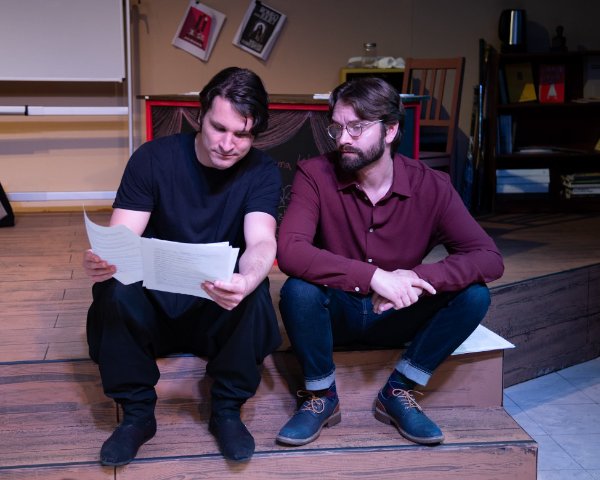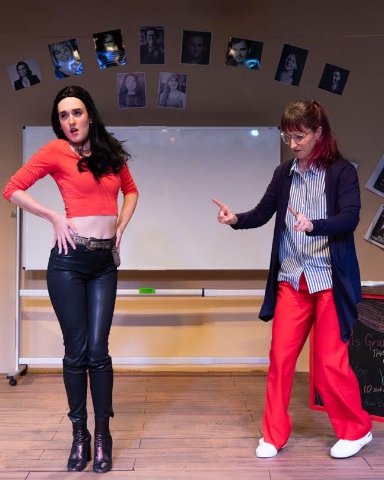The Thanksgiving Play
Altarena Playhouse Explores Marginalization of Native Americans
By: Victor Cordell - Oct 27, 2024
The history of great nations is invariably forged with vicious and violent acts of conquest and subjugation. It sometimes becomes difficult to view such history with self-respect, and many countries formally or informally adulterate facts to whitewash sins of the past.
Most Americans, certainly older ones, grew up with an acute awareness of the meaning of various public holidays. Schools would often honor them with billboards, class lessons, pageants, and such.
And most of us grew to appreciate Thanksgiving as a special and honorable holiday. It was not commercial or partisan like Christmas; didn’t honor war like Memorial Day; and wasn’t thematically inert like New Years. Much as the nearly universal harvest festivals that it derived from, it was a time to give thanks and share nature’s bounty with family (and watch televised football!).
The Thanksgiving Play by Larissa FastHorse was the first play written by a female Native American to reach Broadway. Altarena Playhouse’s production about well-intended people hoping to succeed outside their element hits its mark with fine acting and fine direction from Kimberly Ridgeway and is humorous for the greater part.
Both expressly and implicitly, the play repudiates history suggesting Thanksgiving’s purity being built on the harmonious feast gatherings between New England Pilgrams and the Native Americans of the region. Not to say that there was no peace between the groups, but the fact remains that European settlers disrespected the natives’ very humanity and their traditions, while they massacred and violently displaced them from their homelands. And it only got worse.
This play centers on four white people brought together by frenetic Logan, a teacher who has won a grant to produce and direct a play with four actors illustrating the First Thanksgiving for Native American Heritage Month. She enlists her boyfriend, Jaxton, an unsuccessful actor, who like Logan, is also an earnest do-gooder, as well as dorky Caden, a history teacher who has written a number of plays that have only been performed by elementary school students.
In attempting for inclusion and compliance with the grant, Logan hires the previously unknown attractive, vacuous, yet purposeful, Alicia, from an actor’s publicity shot with her in Native American garb. But shortly after Alicia’s arrival, she reveals that she doesn’t fulfill the ethnic condition. So the challenge becomes how to proceed with political correctness lacking even one Native American participant. The solution that the desperate Logan ultimately proposes follows logic to the point of reductio ad absurdum.
The primary theme of the play concerns performative activism. Although they may be sincere in wanting to promote Native American causes, these aspirants are willing to write and act in the project absent input from a Native American voice, and they get caught up in their own self-promotion. Logan censors acting evaluation discussions between the “actors” in improv sessions, because as the director, she should be the only one to comment on performance. Jaxton’s greatest inclusion concern is that he be included. Caden wants to write a script that is historically expansive and accurate. And finally, Alicia doesn’t want to think about her part, only to be told what to do.
In fairness, however, even the playwright herself acknowledges the challenges of inclusion in geographical areas and particular types of performances where a specific minority group is not well represented. In fact, her motivation for writing an all-white-cast play was in response to pushback on finding appropriate Native American actors to perform a script. And of course, there is the additional bind evidenced in this play that it is against the law to ask the ethnicity of a job applicant.
The script is generally funny and the performers deliver the banter with great panache. The show includes several humorously farcical and sadly shocking Thanksgiving videos of the type that would be shown to primary school kids. One depicts a silly song in which the lyrics to “The 12 Days of Christmas” are replaced with Native American gifts within a Thanksgiving ritual. The climax to the play is ridiculous and a bit gross, but appropriate to the farce that precedes it.
Cary Ann Rosko leads the cast with a splendid portrayal of Logan, frantic and fearing rules and regulations. The highly expressive Rosko sparkles as overwrought and hysterical. Anna Kosiarek delights as the simplistic Alicia who knows that she is not smart but manages to make the most of her endowment without wasting a step. Will Livingston suits the unctuous Jaxton who wishes to be the model of New Age self-awareness. However, his weak commitment to causes is well-revealed as an “intended vegan,” but one who likes cheese too much to give it up. Tyler Iiams fits well as the obsessive compulsive Caden whose endless production of written material seems to come to nothing, as does his yearning for Alicia.
The Thanksgiving Play strikes many chords with great insight and accuracy, particularly about the marginalization of Native Americans and classic stereotypes. Sometimes the issues get a little too crowded to be well absorbed and not every gag works, but even grasping most of the issues surfaced and laughing at most of the quips yields a rewarding theatrical experience.
The Thanksgiving Play is written by Larissa FastHorse, produced by Altarena Playhouse, and plays on its stage at 1409 High Street, Alameda, CA through November 24, 2024.





